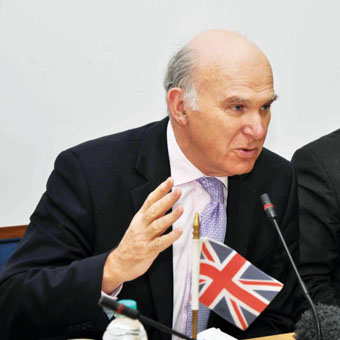We live in a world where we are more connected than ever before. The UK is linked to Japan through business, friendship and a wealth of common interests. Both countries are significant markets for each other’s trade, and targets for highly significant mutual investment. These international connections offer huge potential for growth in trade and investment, as long as markets are open and countries are able to trade freely. The fastest-growing countries tend to be those with the fewest trade barriers. Thus to realise our potential, we must commit to open markets globally. We must not slip back into protectionism.
That is why, on 9 February, the UK government published its Trade and Investment White Paper, an ambitious strategy to nurture international trade and investment relationships, strengthen the multilateral system, build up our domestic business environment, and enable developing countries to build their own paths to growth.
The white paper demonstrates that trade and investment are critical for the UK to achieve strong, sustainable and balanced growth in the future.
It makes the case for: open markets and the dangers of protectionism; removing trade and investment barriers and improving market access for UK business in the EU and beyond; helping to conclude the Doha Development Round of trade talks in 2011; working to strengthen the World Trade Organization; supporting early conclusion of priority EU free trade agreements; supporting trade and regional integration in Africa; and working with G20 members towards these goals.
Our most immediate task is to finalise the Doha trade negotiations. This historic agreement, once signed, will boost the world economy by £110 billion. So we must all move quickly to make 2011 the year in which the Doha trade talks are finalised. Momentum is building. We will be working on plans and roadmaps to meet this goal. A result here will benefit us all. Trade is not a game in which some countries win and others lose, but quite the reverse: we all become richer when trade increases. This helps people pull themselves out of poverty.

Vince Cable on a recent trade visit to New Delhi.
That is why the UK is redoubling its efforts to enable developing countries to follow their own paths to growth through trade and investment, and to build the capacity for this, especially in Africa. We will do all we can to support African leaders to implement their plans outlined in the 1991 Abuja Treaty—to develop free trade areas in each regional economic community as building blocks for a continent-wide customs union and, ultimately, an African economic community.
We are launching an African free trade initiative to help break through trade barriers such as bureaucracy and prohibitive tariffs. We will support Africans in making trade in Africa faster and easier, and encourage African entrepreneurs to grow their businesses by opening up access to new markets. We cannot do this alone and we call on international partners to join us in this effort.
We also want to provide greater market access for the poorest. The UK urges all G20 countries to provide 100% duty free, quota free access to their markets for least developed countries. This could increase their exports by over 40%. We call on all countries to join us in pressing for this. Moreover, we all need to ensure that developing countries can negotiate trade agreements and global trade rules reflect needs in all countries, and not just in a select few. Finally, we want to build networks that help us grow in partnership and support businesses in trading with the world. British government ministers have embarked on a programme of overseas visits with business delegations for exactly this reason.
We have visited all partners in major emerging markets and Europe, as well as the US. The business leaders who accompanied us say this opens a huge number of doors for trade and collaboration with businesses in other countries. The UK is an international hub for investors as well as the world’s third-biggest investor, with firms such as Sharp Corporation, Nissan Motor Company, Ltd. and Mitsubishi Electric Corporation represented in the UK.
We welcome overseas investment. The UK hosts more European headquarters than any other country, and is one of the easiest places in the world to do business. We plan to remain so by cutting regulations and corporation tax. So, a big challenge is before us. It is to keep building an open global economy and trading system that benefits us all. This will drive growth and jobs, while creating wealth around the world. We are confident this is a challenge which the UK, with its international partners including Japan, is able to meet.




